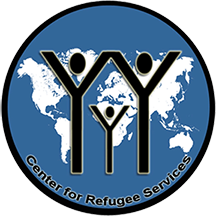The history of CRS began in 2008, when a San Antonio nonprofit organization, Communities In Schools, was awarded a neighborhood action grant by Bank of America designed to improve educational success for a specific underserved neighborhood.
Because the numbers of refugees being resettled in northwest San Antonio was increasing dramatically, CIS chose to create a parent advocacy & education program to assist refugee parents who were unfamiliar with the American educational system.
Furthermore, a CIS clinical caseworker was assigned to work with refugee children on specific school campuses to help children with acclimation issues.
These efforts led to the establishment of the Parent Assistance Resource Center where parents could visit and consult regularly with the clinical caseworker.
Dr. Ria Baker – Founder
Dr. Ria Baker had just completed her doctorate in Counselor Education and Supervision at the University of Texas San Antonio. Her doctoral dissertation title is A Phenomenological Study of the Resettlement Experiences of Somali Bantu Women. Dr. Baker was also a Licensed Professional Counselor. As a naturalized US citizen, Dr. Baker understood directly the challenges inherent in moving to the United States from a different culture.
Gradually, the PARC grew to include English instruction, tutoring, counseling, employment help, providing donations of clothing and household goods to new arrivals. She created a strong network of helpful community partners from churches, retired professionals, schools, and other agencies.
When the grant ended in August 2010, it was clear that there was still much work to be done. Assisted by other college interns and volunteers, Dr. Baker began the process of creating a new nonprofit agency, the Center for Refugee Services.
Nonprofit Status
CRS was granted nonprofit status by the IRS in September 2010.
As an independent 501(c)(3) charitable agency, counseling and social work interns and volunteers became the core staff.
Our common purpose has always been to provide a “one stop” center where refugees can come to receive social support, educational support, and counseling in an environment that is culturally respectful, welcoming and friendly.

Location
CRS chooses to remain close to refugee communities. The majority of new arrivals lived in apartments within walking distance of our location. Our first “office” was a 2 br. apartment on Datapoint Drive.
Supported by a generous grant from Oak Hills Church, CRS operated on a budget of $20K the first 2 years.
Fundraising efforts were small but enthusiasm for the services assured that the new nonprofit would endure. More volunteers joined the CRS “team” and additional clients found their way to the office.
In 2012 the nonprofit moved to a larger townhome where we were able to expand.
By 2014 it was clear that the space was too small so additional funds were raised to rent a commercial building nearby at 8703 Wurzbach Rd., San Antonio, TX 78240. Our center is within walking distance of seven apartment complexes where many refugees reside.
In the early years of CRS’s existence we helped approximately 25-30 refugees per week and each year that number has grown to where we now assist 25-30 per day.
By 2017 Our average visits were 400 per month. Many of the clients have established friendships with center volunteers in an atmosphere of mutual respect and community collaboration.
From a small group of 5-7 volunteers in 2010 we now enjoy strong working relationships with over 30 volunteers and 2 paid staff.
The Road to Self-sufficiency
The first few years are the most difficult in the journey toward self-sufficiency. Refugees strive to learn English, obtain employment, learn a new culture and establish homes. Therefore, assistance from many agencies, businesses and churches is necessary.
The goal is to help clients move toward self-sufficiency as soon as possible. While new arrivals receive limited monetary assistance from federal and state programs, including rent assistance, Food Stamps (SNAP) and Medicaid, these benefits are temporary and discontinue after a few months.
After 6 months or less, refugees are expected to pay their own bills including, rent, utilities, transportation, etc. CRS recognizes that the long journey to community acclimation takes years, not months, especially for older refugees who do not speak English. Therefore, most of our clients have lived in the United States longer than 6 months but still need assistance and referrals in order to be successful.
